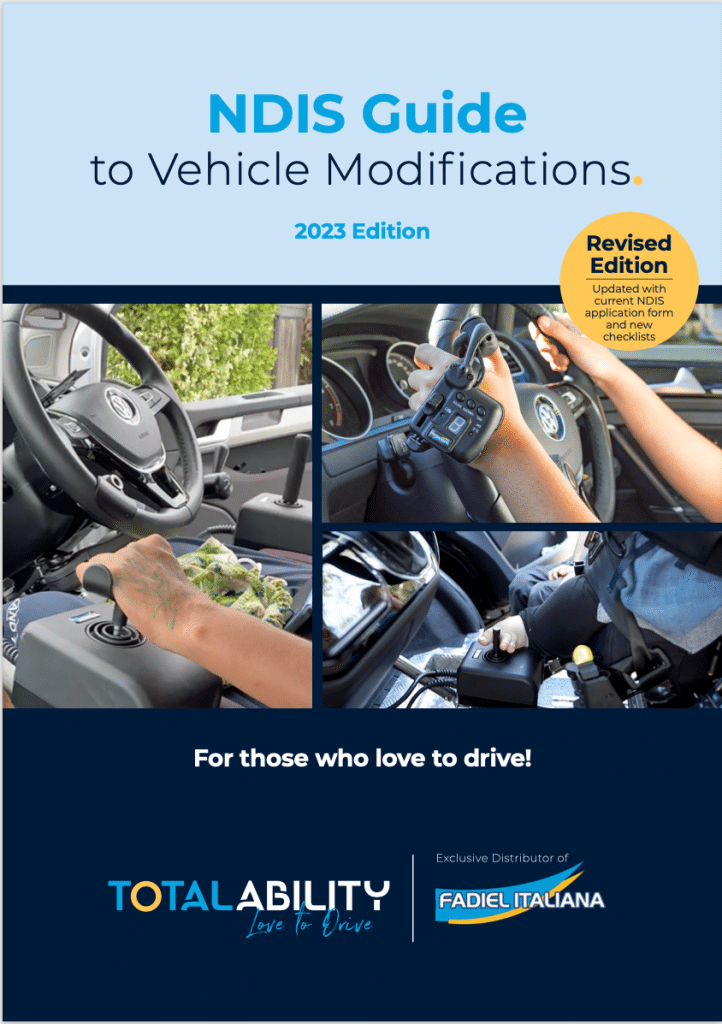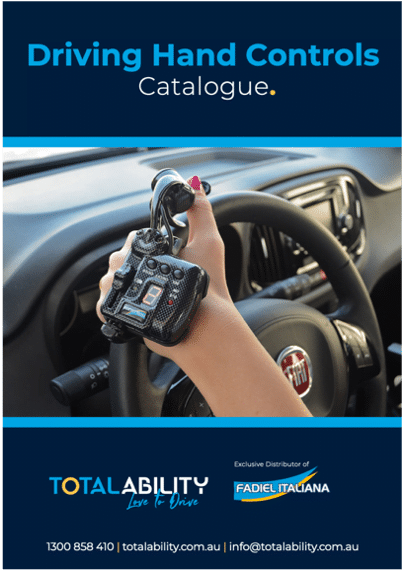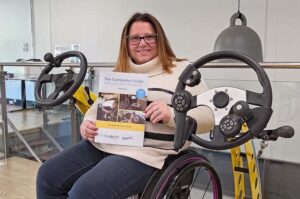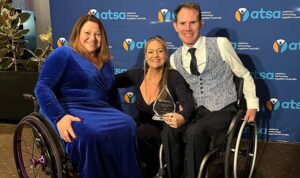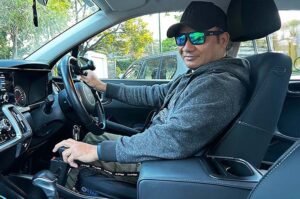
More Than “Getting By” With A Little Help
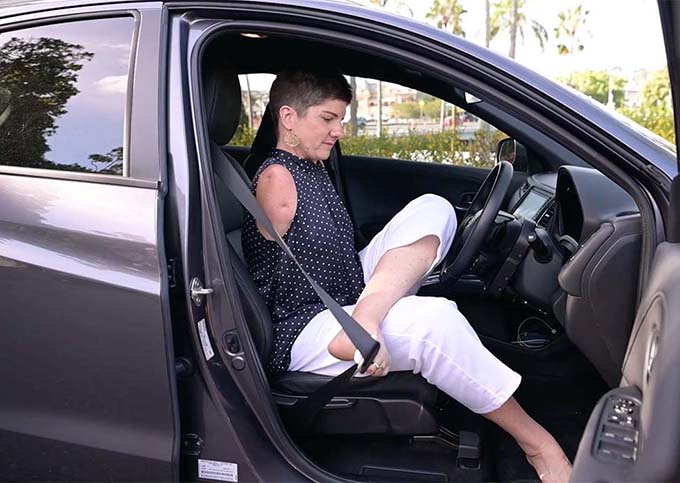
When you speak with ‘The Wingless Warrior’, Kerry-Lee Gockel, you don’t get a sense of any of the feistiness suggested by her nickname. In conversation she is engaging and warm.
Kerry-Lee does attack life: her Instagram account reveals someone who is always on the move, deftly navigating the world using her feet as her hands.
Currently, her busy life includes preparing for her second 10km ocean swim to raise money for Sunshine Coast Special Schools, speaking at events to promote her passionate belief that disability is not inability, and taking an active role as Aunt to her nieces and nephews. Kerry-Lee and husband Paul are in the middle of planning to explore Australia by caravan.
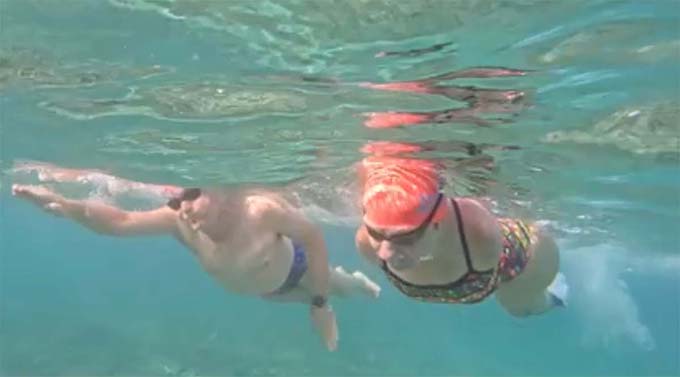
If that wasn’t enough, Kerry-Lee also has a busy job, working full-time at Queensland Government, currently in a project role.
Positive Perspective on Disability
Born with no arms as a result of Congenital Amelia, Kerry-Lee credits her can-do positivity and perspective on disability to her parents.
“They have been instrumental in my life and I’m lucky to have a very strong family unit. My parents didn’t make my disability a focal point for the family, it was just a fact. It means that I feel very comfortable in my skin and I just get on and do things.”
Their approach to solving the problems the world puts in the way of someone without ‘wings’ was pragmatic.
“From a practical point of view, of course having arms would have been helpful, but that wasn’t the case,” Kerry-Lee explains. “We quickly focussed on what I could do rather than what I couldn’t, and to make sure I was as self-supporting as possible.”
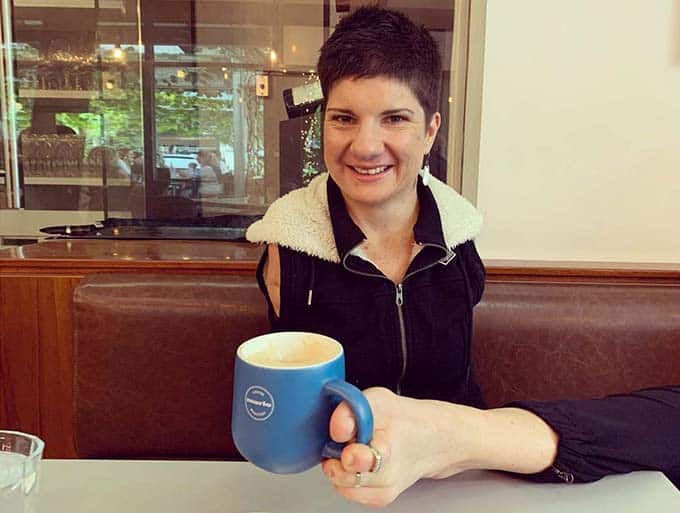
The Road to Driving
A big step in that journey to independence was learning to drive, a seed planted via a chance meeting in a shopping centre in Perth.
“It was back in 1995. My Mum and I walked past a woman who looked like me and we both did a double-take. That’s how I met Wendy, a Thalidomide survivor. One of the things I found out was that she was driving.”
Wendy’s situation wasn’t completely akin to Kerry-Lee’s: she had short limbs and could use her arms to steer, but via Wendy they got in touch with Christine in Germany.
“Christine and I are almost identical,” Kerry-Lee continues, “and coincidentally Christine was holidaying in Australia in 1996. We met and exchanged a lot of information including how she drove a modified car.”
However, this was before the NDIS and Kerry-Lee’s parents couldn’t afford modifications, but the flame had been lit, so they looked for other avenues.
“We got in contact with Brett Nielsen, the first baby affected by Thalidomide born in Australia. We’d heard he was driving… but he was using his right foot on the steering wheel!”
Nielsen had the outlook of “modify your world as little as possible”, and encouraged Kerry-Lee to follow his path, which is how Kerry-Lee, then 16, ended up in a paddock sitting next to Brett in a car that didn’t move for 20 minutes as her concerned parents watched on.
It’s an incident Kerry-Lee recalls as “a defining moment”.
The First Hurdle
“Brett wouldn’t let me drive until I had put my seatbelt on myself — something I had never done before. My left leg was hyper-mobile, my right leg wasn’t and Brett was asking me to do something I didn’t think was possible.”
Kerry-Lee overcame her self-doubt, eventually fastened her belt and finally started the engine. “It was an emotionally draining day. I was so excited about starting to drive, but it so very nearly didn’t happen!”
Brett got the ball rolling that day, but, ongoing, Kerry-Lee would need formal driving lessons.
Getting Lessons
“I was fortunate to find specialist driving instructor Ivor Booker. He’d never taught someone who drove with their feet, but was undaunted. He was incredible and deserves the accolades. A very patient man!”
This was new territory for everyone, so before taking her driving test, Ivor contacted the assessor to make sure there was nothing that would stop it from going ahead. Once assured, Kerry-Lee passed first time, just before her 18th birthday, and just before her last day at school.
“School insisted that anyone driving themselves there had to hand in their keys at the front desk on arrival,” Kerry-Lee recalls with pride. “I insisted on handing my keys in even though it was highly unlikely I would leave early unnoticed!”
Freedom through Driving
For Kerry-Lee, driving was transformative.
“The sense of freedom was something I hadn’t experienced before,” Kerry remembers. “Up to that point I’d required someone else’s help for most things in my life. Suddenly there was one thing I didn’t need anyone else’s help to do. Now I could help others, giving my friends a lift.”
It also led to some treasured moments with her Grandmother. “Gran never learnt to drive,” Kerry explains, “so it was lovely to be able to drive her to the shops or to see friends. My grandparents often helped my parents while my sister and I were growing up, so to be able to return the favour to Gran and spend time with her was very special.”
Kerry-Lee drove for many years with only minor modifications of a left foot accelerator (steering with her right foot so she could rest it on the door when stationary), a lever on the handbrake and extension rod on the car’s indicators.
The Need for New Controls
However, as she got older, she noticed things began to change. “It began with some lower back pain if I drove for more than 45 minutes, then my knee started to ache, and a couple of times I experienced pins and needles and numbness in my foot.”
Kerry-Lee realised that her driving position was causing physical issues, but also mental ones.
“I was limiting how far I was driving, and worrying that even a small accident could injure parts of my body I rely on to complete daily tasks. I was concerned I’d only be able to drive for another decade or so.”
Whilst Brett Nielsen’s advice about modifying her world as little as possible is still part of Kerry-Lee’s thinking, she has also started to take a more pragmatic approach.
“I realise that in some situations it’s better to ask for help. My husband Paul (who also has a disability) and I aren’t shy to rely on family, friends and support workers to give us a hand with tasks that we can’t do or that are more difficult for us to do independently. It’s a flexible way of thinking that enables us to enjoy a greater range of activities than if we’d maintained a more self-reliant stance.”
And so Kerry-Lee started to research alternatives to how she was driving, leading her to Total Ability and Fadiel’s range of class-leading controls.
With the help of NDIS funding, Kerry-Lee now uses Fadiel’s Mini-Wheel Steering system positioned in her car’s footwell, enabling her to sit in a safer, normal driving position.
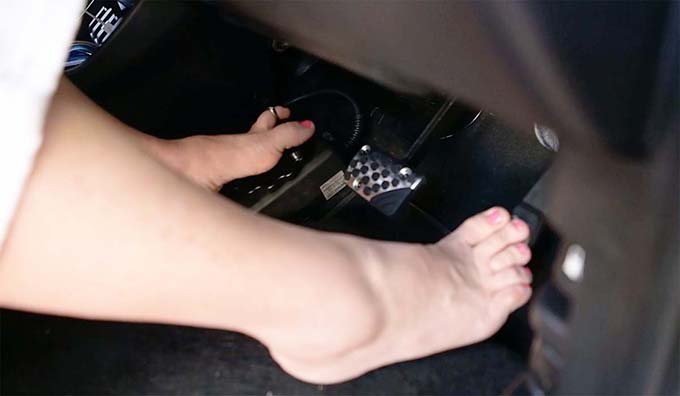
“I have to say that it was daunting to suddenly change the driving habits of 20 years. I would now be steering with my left foot, and using my right to accelerate and brake.” Kerry-Lee explains.
Adjusting … then a Breakthrough
“There was a period of adjustment, and a bit of self doubt, but I’m through that now, and back to really loving to drive again. The change was well worth the wait for funding.”
“I even had a few driving lessons with Ivor Booker after my new modifications were installed — not many people have driving lessons with the same instructor 20 years later!”
As the video below of Kerry-Lee using her new controls shows, there is some of the modern technology that she hasn’t chosen to install. We asked her why she still uses pads in her headrest linked to her indicators.
“Everyone asks me that! Why don’t I install ‘voice command’ for indicators, wipers and windows? Part of my love of driving is being on my own in my car with my music really cranked up. I’m an 80s rock tragic, and I wasn’t going to be turning my music down any time soon!”
“But the technology is brilliant. I know I’ve found the right equipment for me. Driving is pure joy again. I’m confident I’m able to drive wherever I need to go, probably for the rest of my life.”
Kerry-Lee’s open water ocean swim to raise money for children at the Nambour, Palmview and Currimundi Special schools is on 13 May 2023. Please donate to show your support here.
Video Credit: Alice Pavlovic
This Guide covers:
- Initial Assessment
- Understanding the Plan
- Assistive Technology and the NDIS
- State Motoring Authorities
- Assessment Considerations
- Quotes and Evidence
- High-cost Vehicle Modifications
- Complete the NDIS Application
- After Lodgement
- Checklists
Driving Hand Controls Catalogue includes:
- Our complete range of driving hand controls
- For each control, the disabilities and conditions they are suitable for
- A comparison chart outlining the benefits and features of the various types of hand controls
- The history of Fadiel Italiana high level modification driving systems


